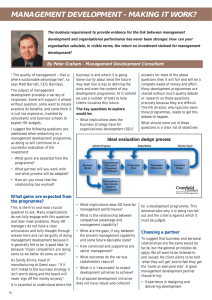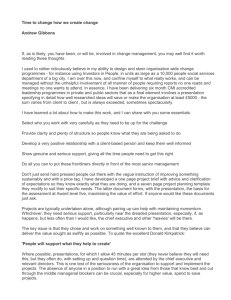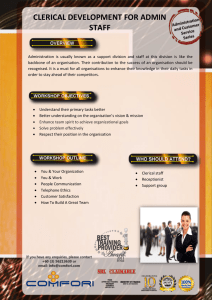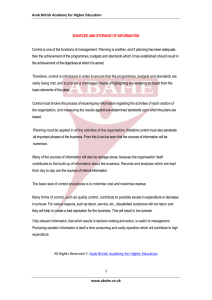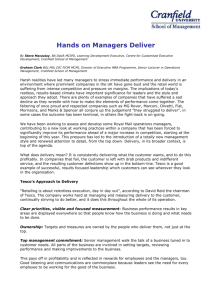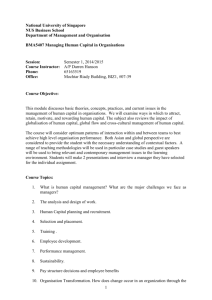EXECUTIVE DEVELOPMENT TODAY
advertisement
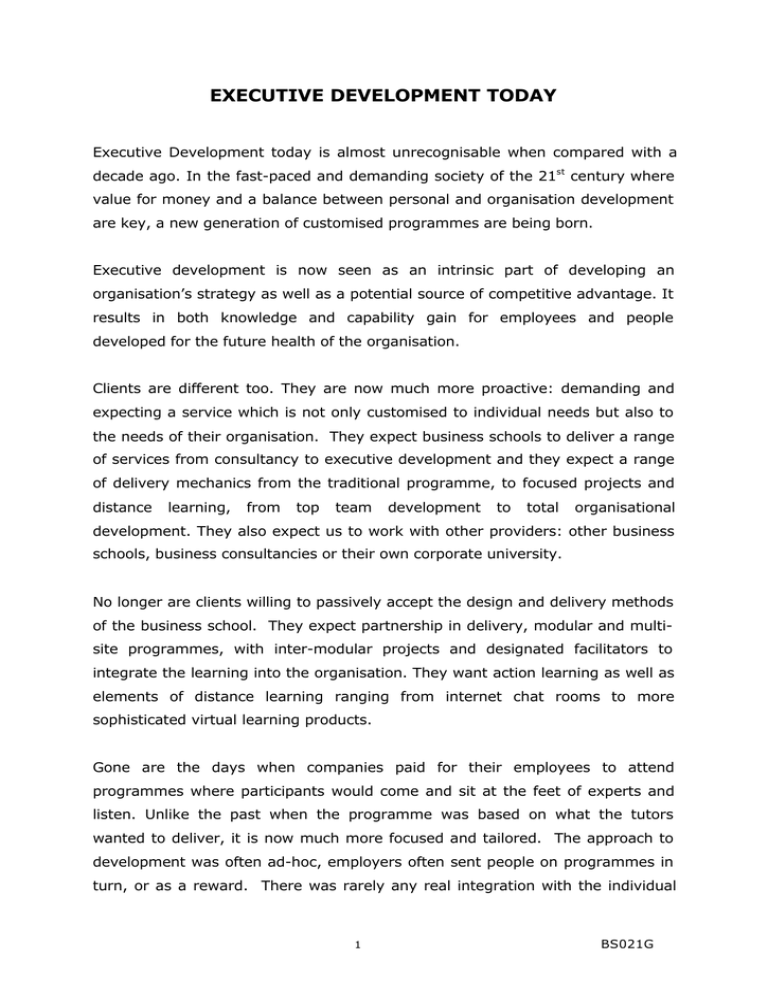
EXECUTIVE DEVELOPMENT TODAY Executive Development today is almost unrecognisable when compared with a decade ago. In the fast-paced and demanding society of the 21st century where value for money and a balance between personal and organisation development are key, a new generation of customised programmes are being born. Executive development is now seen as an intrinsic part of developing an organisation’s strategy as well as a potential source of competitive advantage. It results in both knowledge and capability gain for employees and people developed for the future health of the organisation. Clients are different too. They are now much more proactive: demanding and expecting a service which is not only customised to individual needs but also to the needs of their organisation. They expect business schools to deliver a range of services from consultancy to executive development and they expect a range of delivery mechanics from the traditional programme, to focused projects and distance learning, from top team development to total organisational development. They also expect us to work with other providers: other business schools, business consultancies or their own corporate university. No longer are clients willing to passively accept the design and delivery methods of the business school. They expect partnership in delivery, modular and multisite programmes, with inter-modular projects and designated facilitators to integrate the learning into the organisation. They want action learning as well as elements of distance learning ranging from internet chat rooms to more sophisticated virtual learning products. Gone are the days when companies paid for their employees to attend programmes where participants would come and sit at the feet of experts and listen. Unlike the past when the programme was based on what the tutors wanted to deliver, it is now much more focused and tailored. The approach to development was often ad-hoc, employers often sent people on programmes in turn, or as a reward. There was rarely any real integration with the individual 1 BS021G development needs or correlation to the needs of the role. Since the days of this ‘sheep-dip’ management development approach it has become more formalised. This evolution came with the development of performance management systems and was gradually linked to performance review processes and internal organisation career development systems. Many organisations have moved away from sending employees to public programmes: they have sought to try to integrate development into their organisational growth, using customised programmes where individuals have to develop a continuous learning approach. Programmes are not just an event any more, they are a process, which, more significantly, can be used as a method to change the culture of organisations. This type of customised development will be reflected in a change of leadership style within the organisation. As more and more employees from the same company go through the development process, the organisation will develop consistency in approach and a change in the organisational culture. Changes in leadership style are an integral part of how an organisation develops. This focusing of executive development has been accompanied by a questioning of its value. HR directors, in particular, have been tasked within the organisation to justify investment in executive development in terms of benefits to the organisation as well as benefits to the individual. The result is that clients are justifiably much more pro-active and demanding in their relationships with business schools. The development of corporate universities, particularly those developed by a number of the leading international companies, was viewed by some as a significant challenge and a danger to business schools. However, other business schools including Cranfield, have recognised that corporate universities present a major opportunity in terms of developing relationships and opportunities to impact on large international organisations. Firms often come to business schools with a high priority to achieve organisational change in an increasingly competitive environment. Customised 2 BS021G management development programmes have to meet this need through a combination of methods. The increasing sophistication of the participant and the HR function means that many executives have already received a great deal of executive development. Many will come on programmes having already gained MBAs or business studies degrees. The programmes therefore have to increasingly meet the new demands of both those individuals and their organisation. In addition, the customer is well aware of the positioning of the business school in the market place through the growth of league tables produced by organisations such as the Financial Times and Business Week. The Financial Times currently ranks Cranfield School of Management in the top three UK providers of executive development. Partnering with a business school to provide a significant customised programme of development often represents a high investment decision for an organisation. Whilst the league tables can provide one source of guidance, choosing a partner who is really going to deliver what the organisation requires can be challenging. In the late 1990s Laporte asked David Clutterbuck to assist them in their selection of a business school partner. He sought to move beyond the “beauty parade” approach to a more robust selection checklist which he shared in his article in People Management, December 2000. Critical in his view are: a) Deciding on the main purpose of the learning agenda - is it to close individual skill gaps or is it to change the culture of the organisation? b) Ensuring live management buy-in to the school and the agreed programme c) Testing the school and the relationship by visiting and checking their client management process, teaching facilities and other hygiene factors d) Ensuring there is executive development success criteria and an evaluation process beyond the end of programme “happy sheets” e) Allowing sufficient time to develop the relationship and the programme. At the beginning this process will be more important than the programme 3 BS021G f) Checking the business school has the ability to sustain the relationship and is skilled in executive and organisation development processes as well as traditional academic processes. Through its Centre for Customised Executive Development, Cranfield School of Management has always been in a strong position to turn customer needs into excellent learning experiences. The role of their Executive Development Consultant in managing the relationship with the client, along with the depth of academic knowledge, is a unique advantage for the School. The Centre is at the forefront of developing relationships and interventions which will truly add value to their client organisations. At Cranfield, the customised management development programmes, tailored specifically to meet the needs of individual organisations have included work with Schering, Lufthansa, Orange and Barclaycard, as well as working in partnership with other international business schools such as Babson, Columbia and Duke. Business school clients now demand and expect a range of HR development services which frequently includes a total process from progressing the development needs of the organisation, developing competency frameworks, 360 degree feed-back instruments and other traditional HR consultancy services. Therefore the business school frequently requires a different skills set to the one traditionally attributed to the academic tutor. Cranfield is proud of its growing reputation for Executive Development. Our consultants maintain close business links affording them up-to-date business knowledge which, when combined with the input of the faculty, sets Cranfield apart from other providers. Customisation for a client no longer means changing the logo on the material, it is becoming a critical and highly skilled element in delivery of service that meets the demands of an organisation in a joint partnership which must not only be business oriented but also client-driven. 4 BS021G • Cranfield School of Management is one of the few business schools to be accredited by all three MBA accrediting bodies: AACSB, EQUIS and AMBA. • For more information about customised development programmes please contact the Business Development Executive, Tel: +44 (0) 1234 754426, Fax: +44 (0) 1234 752269, www.cranfield.ac.uk/som/cced 5 BS021G
